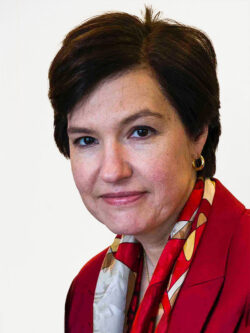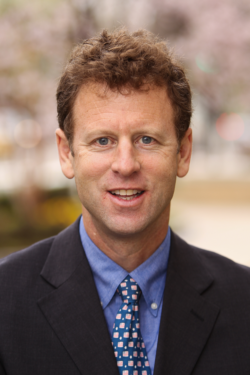A New Era of American Imperialism?
May 12th, 2025 12:00PM -1:00PM
The second Trump presidency has exhibited a resurgence of expansionist policies reminiscent of early 20th-century imperialism. Bold geopolitical moves have been proposed targeting regions of strategic importance such as the Panama Canal, Greenland, and Canada.
Join us for a discussion of the driving forces behind this modern imperialism, and the potential consequences for international relations and global stability. We will be joined by Susan B. Glasser, staff writer at The New Yorker, and Michael O'Hanlon, Philip H. Knight Chair in Defense and Strategy and director of research at the Brookings Institution.
About Our Speakers
 Susan B. Glasser is a staff writer at The New Yorker based in Washington, D.C., writes a weekly column on life in Washington and is a host of the Political Scene podcast.
Susan B. Glasser is a staff writer at The New Yorker based in Washington, D.C., writes a weekly column on life in Washington and is a host of the Political Scene podcast.
Glasser has served as the top editor of several Washington publications, including Politico, where she founded the award-winning Politico Magazine, and Foreign Policy, which won three National Magazine Awards, among other honors, during her tenure as editor-in-chief. Before that, she worked for a decade at the Washington Post, where she was the editor of Outlook and national news. She also oversaw coverage of the impeachment of Bill Clinton, served as a reporter covering the intersection of money and politics, spent four years as the Post’s Moscow co-bureau chief, and covered the wars in Iraq and Afghanistan. She started her journalism career in the nineteen-eighties, as an intern at the Capitol Hill newspaper Roll Call, which she later edited.
Her books include “Kremlin Rising,” “The Man Who Ran Washington,” and “The Divider,” a best-selling history of Donald Trump in the White House, which she co-wrote with her husband, Peter Baker.
 Michael O’Hanlon is the inaugural holder of the Philip H. Knight Chair in Defense and Strategy and director of research in the Foreign Policy program at the Brookings Institution, where he specializes in U.S. defense strategy and budgets, the use of military force, and American national security policy. He is a senior fellow and directs the Strobe Talbott Center on Security, Strategy, and Technology. He co-directs the Africa Security Initiative as well. He is an adjunct professor at Georgetown University and Columbia University and a member of the Pentagon’s Defense Policy Board; he was also a member of the external advisory board at the Central Intelligence Agency from 2011-12. In 2023, O’Hanlon published a book titled “Military History for the Modern Strategist: America’s Major Wars since 1861.” The paperback version of the book, with a preface covering the American Revolution as well as the declared wars of the 19th century, came out in 2024.
Michael O’Hanlon is the inaugural holder of the Philip H. Knight Chair in Defense and Strategy and director of research in the Foreign Policy program at the Brookings Institution, where he specializes in U.S. defense strategy and budgets, the use of military force, and American national security policy. He is a senior fellow and directs the Strobe Talbott Center on Security, Strategy, and Technology. He co-directs the Africa Security Initiative as well. He is an adjunct professor at Georgetown University and Columbia University and a member of the Pentagon’s Defense Policy Board; he was also a member of the external advisory board at the Central Intelligence Agency from 2011-12. In 2023, O’Hanlon published a book titled “Military History for the Modern Strategist: America’s Major Wars since 1861.” The paperback version of the book, with a preface covering the American Revolution as well as the declared wars of the 19th century, came out in 2024.
O’Hanlon’s other books include “The Art of War in an Age of Peace: U.S. Grand Strategy and Resolute Restraint” (Yale, 2021); “Defense 101: Understanding the Military of Today and Tomorrow” (Cornell, 2021); “The Senkaku Paradox: Risking Great Power War over Limited Stakes (Brookings, 2019); “Beyond NATO: A New Security Architecture for Eastern Europe” (Brookings, 2017); “The Future of Land Warfare” (Brookings, 2015); “Strategic Reassurance and Resolve: U.S.-China Relations in the 21st Century” (with Jim Steinberg, Princeton University Press, 2014); “Crisis on the Korean Peninsula” (with Mike Mochizuki, McGraw-Hill, 2003); “Winning Ugly: NATO’s War to Save Kosovo” (with Ivo Daalder, Brookings, 2000); and several other books. His articles have appeared in Foreign Affairs, The National Interest, Survival, Washington Quarterly, Joint Forces Quarterly, and International Security, among other publications; he has also written hundreds of op-eds in major newspapers. Recent articles include a detailed analysis of the U.S. defense budget, a military assessment of a possible Chinese blockade of Taiwan, and a proposal with Georgetown Professor Lise Howard for a new security architecture for eastern Europe. O’Hanlon has appeared on television or spoken on the radio more than 4,000 times since September 11, 2001.
O’Hanlon was an analyst at the Congressional Budget Office from 1989-1994, where he won the Director’s Award in 1992. His doctorate from Princeton is in public and international affairs, where he was awarded a National Science Foundation fellowship. His bachelor’s and master’s degrees, also from Princeton, are in the physical sciences. He served as a Peace Corps volunteer in the Democratic Republic of Congo from 1982-1984, where he taught college and high school physics in French. Earlier, he worked on a dairy farm in Upstate New York, where he grew up. During college, he attempted (unsuccessfully) with a team of Princeton experimental physicists in the “Gravity Group” to disprove Einstein’s General Theory of Relativity.
Amazon is an underwriting sponsor of all World Affairs Council Community Programs.